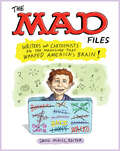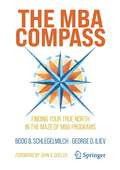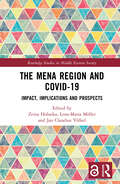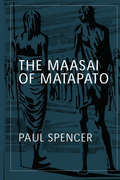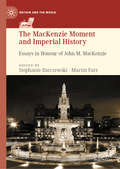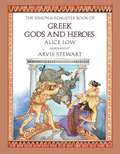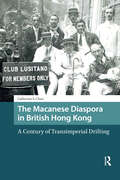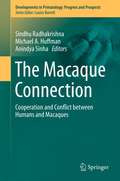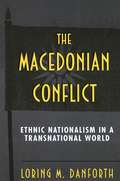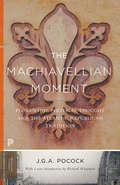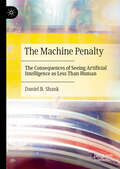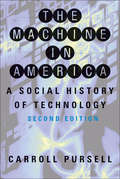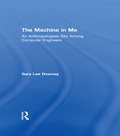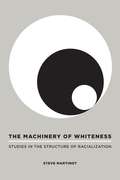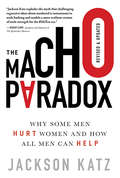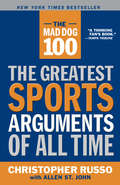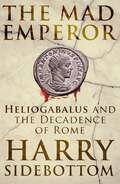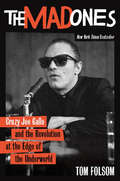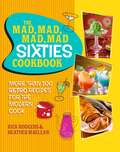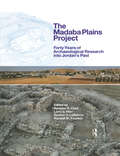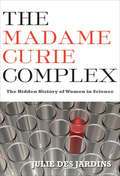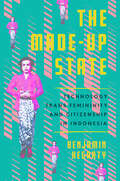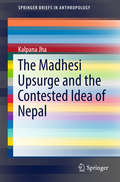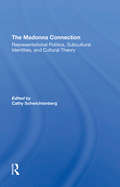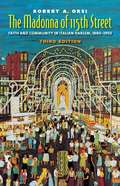- Table View
- List View
The MAD Files: Writers and Cartoonists on the Magazine that Warped America's Brain!
Celebrate America's zaniest and most subversive magazine in 26 essays and comix from all-star contributors, including Roz Chast, Jonathan Lethem, and Grady Hendrix.Before SNL and the wise-guy sarcasm of Letterman and Colbert, before The Simpsons and online memes, there was . . . MAD.A mainstay of countless American childhoods, MAD magazine exploded onto the scene in the 1950s and gleefully thumbed its nose at all the postwar pieties. MAD became the zaniest, most subversive satire magazine ever to be sold on America&’s newsstands, anticipating the spirit of underground comix and &’zines and influencing humor writing in movies, television, and the internet to this day.Edited by David Mikics, The MAD Files celebrates the magazine&’s impact and the legacy of the Usual Gang of Idiots who transformed puerile punchlines and merciless mockery into an art form. 26 essays and comics present a varied, perceptive, and often very funny account of MAD&’s significance, ranging from the cultural to the aesthetic to the personal.Art Spiegelman reflects on how he &“couldn&’t learn much about America from my refugee immigrant parents—but I learned all about it from MAD&”Roz Chast remembers how the magazine was &“love at first sight. . . . It was one of my first inklings that there were other people out there who found the world as ridiculous as I did.&”David Hajdu and Grady Hendrix zero in on MAD&’s hilarious movie spoofsLiel Leibovitz delves into the Jewishness behind the magazine&’s humorand Rachel Shteir amplifies the often unsung contributions of MAD&’s women artists.Several essays are admiring profiles of the individual creators that made MAD what it was: Mort Drucker, Harvey Kurtzman, Al Jaffee, Antonio Prohias, and Will Elder. For longtime fans and new readers alike, The MAD Files is an indispensable guide to America&’s greatest satire magazine.
The MBA Compass: Finding Your True North in the Maze of MBA Programs
by Bodo B. Schlegelmilch George D. IlievLooking to pursue an MBA? The journey can be daunting, but fear not - this book is here to guide you every step of the way.With so many business schools and programs to choose from, it's important to know what you're looking for. That's where this book comes in. The authors help you understand the differences between full-time, modular, online, and executive MBAs, and provide expert advice on selecting the right program for your unique needs. But that's not all – the book also shows you how to make the most of your MBA experience, helping you to develop knowledge, skills, and personal growth. It explores the benefits of alumni associations and shows you how an MBA can be a game-changer for your career.And here's the best part - you don't need to spend a fortune on a Harvard or Stanford MBA to achieve your goals. The book introduces you to a range of high-quality MBA programs across the globe, from Europe to China, India to Latin America, that offer top-notch alternatives that won't break the bank.Whether you're a senior manager, entrepreneur, or fresh out of college, this book is the ultimate resource for anyone seeking to unlock their full potential with an MBA.
The MENA Region and COVID-19: Impact, Implications and Prospects (Routledge Studies in Middle Eastern Society)
by Zeina HobaikaFocusing on the Middle East and North Africa (MENA) region, which comprises some of the world’s richest countries next to some of the poorest, this book offers excellent insights into the discriminatory consequences of the COVID-19 pandemic. With a geographic focus on the MENA region, the multidisciplinary case studies collected in this edited volume reveal that the coronavirus’s impact patterns are a question of two variables: governance performance and socioeconomic potency. Given the global, unprecedented, complex, and systemic nature of COVID-19 – and its long-term implications for societies, governments, international organisations, citizens and corporations – this volume entails a relevance to regions undergoing similar dynamics. Analyses in the book, therefore, have implications for the comparative study of the pandemic and its impact on societies around the globe. Understanding related dynamics and implications, and making use of lessons learned, are a pathway to deal with future similar crises. Questions covered in the volume are relevant to geopolitics, social implications and the relations between political leaders and citizens as beings embedded in various strategies of communication. The volume will appeal to scholars of international politics, political science, risk or crisis governance, economics and sociology, human rights and security, political communication and public health.
The Maasai of Matapato: A Study of Rituals of Rebellion (Routledge Classic Ethnographies)
by Paul SpencerWhen first published in 1988, this classic study was the first to relate the dynamics of the Maasai age organisation to the tensions within the family. Together, these provide the twin strands of a man's career, opposed ritually and reflecting a fundamental ambivalence in Maasai thought. The analysis is illustrated with extensive case material from the the Matapato, selected for this study as a typical Maasai group.
The MacKenzie Moment and Imperial History: Essays in Honour of John M. MacKenzie (Britain and the World)
by Stephanie Barczewski Martin FarrThis book celebrates the career of the eminent historian of the British Empire John M. MacKenzie, who pioneered the examination of the impact of the Empire on metropolitan culture. It is structured around three areas: the cultural impact of empire, 'Four-Nations' history, and global and transnational perspectives. These essays demonstrate MacKenzie’s influence but also interrogate his legacy for the study of imperial history, not only for Britain and the nations of Britain but also in comparative and transnational context. Written by seventeen historians from around the world, its subjects range from Jumbomania in Victorian Britain to popular imperial fiction, the East India Company, the ironic imperial revivalism of the 1960s, Scotland and Ireland and the empire, to transnational Chartism and Belgian colonialism. The essays are framed by three evaluations of what will be known as 'the MacKenzian moment' in the study of imperialism.
The MacMillan Book of Greek Gods and Heroes
by Arvis Stewart Alice Low Barry R. KatzThe gods and heroes of ancient Greece shake heaven and earth in a collection of over thirty stories that breath new life into the myths of Olympus. Here is the triumphant tale of the Trojan Horse, the tragedy of Oedipus, the downfall of Medusa and more. Witness the grand drama of some of the best known heroes of all time in a fresh rendition of these timeless tales.
The Macanese Diaspora in British Hong Kong: A Century of Transimperial Drifting (Asian History)
by Catherine S. ChanDiaspora transformed the urban terrain of colonial societies, creating polyglot worlds out of neighborhoods, workplaces, recreational clubs, and public spheres. It was within these spaces that communities reimagined and reshaped their public identities vis-à-vis emerging government policies and perceptions from other communities. Through a century of Macanese activities in British Hong Kong, The Macanese Diaspora in British Hong Kong: A Century of Transimperial Drifting explores how mixed-race diasporic communities survived within unequal, racialized, and biased systems beyond the colonizer-colonized dichotomy. Originating from Portuguese Macau yet living outside the control of the empire, the Macanese freely associated with more than one identity and pledged allegiance to multiple communal, political, and civic affiliations. They drew on colorful imaginations of the Portuguese and British empires in responding to a spectrum of changes encompassing Macau’s woes, Hong Kong’s injustice, Portugal’s political transitions, global developments in print culture, and the rise of new nationalisms during the inter-war period.
The Macaque Connection
by Michael A. Huffman Anindya Sinha Sindhu RadhakrishnaThe concept of this book arises from a symposium entitled "Human-Macaque Interactions: Traditional and Modern Perspectives on Cooperation and Conflict " organized at the 23rd Congress of the International Primatological Society, that was held in Kyoto in September 2010. The symposium highlighted the many aspects of human-macaque relations and some of the participants were invited to contribute to this volume. The volume will include about 11 chapters by a variety of international authors and some excerpts from published literature that illustrate cultural notions of macaques. Contributions from invited authors will engage with four main perspectives - traditional views of macaques, cooperative relationships between humans and macaques, current scenarios of human-macaque conflict, and how living with and beside humans has affected macaques. Authors will address these concerns through their research findings and reviews of their work on the Asian, and the lone African, macaques.
The Macedonian Conflict: Ethnic Nationalism in a Transnational World
by Loring M. DanforthGreeks and Macedonians are presently engaged in an often heated dispute involving competing claims to a single identity. Each group asserts that they, and they alone, have the right to identify themselves as Macedonians. The Greek government denies the existence of a Macedonian nation and insists that all Macedonians are Greeks, while Macedonians vehemently assert their existence as a unique people. Here Loring Danforth examines the Macedonian conflict in light of contemporary theoretical work on ethnic nationalism, the construction of national identities and cultures, the invention of tradition, and the role of the state in the process of building a nation. The conflict is set in the broader context of Balkan history and in the more narrow context of the recent disintegration of Yugoslavia. Danforth focuses on the transnational dimension of the "global cultural war" taking place between Greeks and Macedonians both in the Balkans and in the diaspora. He analyzes two issues in particular: the struggle for human rights of the Macedonian minority in northern Greece and the campaign for international recognition of the newly independent Republic of Macedonia. The book concludes with a detailed analysis of the construction of identity at an individual level among immigrants from northern Greece who have settled in Australia, where multiculturalism is an official policy. People from the same villages, members of the same families, living in the northern suburbs of Melbourne have adopted different national identities.
The Machiavellian Moment: Florentine Political Thought and the Atlantic Republican Tradition
by J. G. Pocock Richard WhatmoreOriginally published in 1975, The Machiavellian Moment remains a landmark of historical and political thought. Celebrated historian J.G.A. Pocock looks at the consequences for modern historical and social consciousness arising from the ideal of the classical republic revived by Machiavelli and other thinkers of Renaissance Italy. Pocock shows that Machiavelli's prime emphasis was on the moment in which the republic confronts the problem of its own instability in time, which Pocock calls the "Machiavellian moment."After examining this problem in the works of Machiavelli, Guicciardini, and Giannotti, Pocock turns to the revival of republican ideology in Puritan England and in Revolutionary and Federalist America. He argues that the American Revolution can be considered the last great act of civic humanism of the Renaissance and he relates the origins of modern historicism to the clash between civic, Christian, and commercial values in eighteenth-century thought.This Princeton Classics edition of The Machiavellian Moment features a new introduction by Richard Whatmore.
The Machine Penalty: The Consequences of Seeing Artificial Intelligence as Less Than Human
by Daniel B. ShankThis book makes the argument that comparing AI to humans leads us to diminish similar outcomes from AI across situations. This may be taking a human&’s advice for a restaurant recommendation over an AI&’s or believing that AI can&’t be as biased as people can when denying loans to others. This machine penalty is caused both by comparing humans and AI in terms of appearance, identity, behavior, mind, and essence, and by situations involving controllable, personal, important, subjective, or moral decisions. It can be applied across many different situations, where we diminish different AI outcomes. We penalize machines&’ influence when they give advice, fairness when they evaluate people, blame when they cause harm, value when they produce art, and satisfaction when they provide companionship. The result is immediate consequences in those domains and downstream consequences for society. This monograph brings together diverse research from human-computer interaction, psychology, sociology, and communication including theories such as Computers Are Social Actors, anthropomorphism, mind perception, and algorithm aversion to present an expansive argument and evidence for the machine penalty.
The Machine in America: A Social History of Technology
by Carroll Pursell2008 Outstanding Academic Title, Choice MagazineFrom the medieval farm implements used by the first colonists to the invisible links of the Internet, the history of technology in America is a history of society as well. Arguing that "the tools and processes we use are a part of our lives, not simply instruments of our purpose," historian Carroll Pursell analyzes technology's impact on the lives of women and men, on their work, politics, and social relationships—and how, in turn, people influence technological development.Pursell shows how both the idea of progress and the mechanical means to harness the forces of nature developed and changed as they were brought from the Old World to the New. He describes the ways in which American industrial and agricultural technology began to take on a distinctive shape as it adapted and extended the technical base of the industrial revolution. He discusses the innovation of an American system of manufactures and the mechanization of agriculture; new systems of mining, lumbering, and farming, which helped conquer and define the West; and the technologies that shaped the rise of cities. In the second edition of The Machine in America, Pursell brings this classic history up to date with a revised chapter on war technology and new discussions on information technology, globalization, and the environment.
The Machine in Me: An Anthropologist Sits Among Computer Engineers
by Gary Lee DowneyFirst Published in 1998. Routledge is an imprint of Taylor & Francis, an informa company.
The Machinery of Whiteness: Studies in the Structure of Racialization
by Steve MartinotIn this follow up to his book, The Rule of Racialization—which considered the way class structure is formed in the U. S. —Steve Martinot now examines how the structures of racialization reside at the core of all social, cultural, and political institutions in the U. S. In The Machinery of Whiteness, Martinot examines how race and racism are produced in the United States, analyzing the politics of racialization, and the preponderance of racial segregation and racial deprivation that have kept the U. S. a white dominated society throughout its history. Martinot dedicates this work to expunging white supremacy from the earth. The Machinery of Whiteness investigates how “whiteness” came to be as foundational to the process that then produced the modern concept of race. Martinot addresses the instrumentalization of women as a necessary step in its formation, furthering the debates regarding the relationships of race and gender. And he addresses U. S. international interventionism, the anti-immigrant movements, and white racist populism to describe the political forms that white supremacy takes. Martinot puts these together to analyze the underlying cultural structures of racialization that have driven and conditioned the resurgence of white supremacy and white entitlement in the wake of the Civil Rights movements. This book is a call to transform the cultural structures of the U. S. to make justice and democracy, which depend on inclusion and not segregation, possible.
The Macho Paradox: Why Some Men Hurt Women and How All Men Can Help
by Jackson Katz"A candid look at the cultural factors that lend themselves to tolerance of abuse and violence against women."—Booklist Revised and updated to include current studies, politics, and discussions, The Macho Paradox is the first book to show how violence against women is a male issue as well as a female one — and how we can come together to stop it. Written by pioneering anti-violence educator Jackson Katz, The Macho Paradox incorporates the voices and experiences of women and men who have confronted the problem from all angles, the discussions surrounding currents events in politics and pop-culture, and where the violence is ignored or encouraged in our upbringing. Katz also offers cogent explanations for why so many men harass and hurt women, and he shows what can be done to stop the violence. By working together as allies, Katz shows how all genders can end the abuse and mistreatment of women.Additional Praise for The Macho Paradox:"If only men would read Katz's book, it could serve as a potent form of male consciousness-raising."—Publishers Weekly"These pages will empower both men and women to end the scourge of male violence and abuse. Katz knows how to cut to the core of the issues, demonstrating undeniably that stopping the degradation of women should be every man's priority."—Lundy Bancroft, author of Why Does He Do That?: Inside the Minds of Angry and Controlling Men
The Mad Dog 100: The Greatest Sports Arguments of All Time
by Chris Russo Allen St. JohnTHE ESSENTIAL BOOK FOR ANY SPORTS FAN, FROM ONE OF THE REIGNING KINGS OF SPORTS TALK RADIO, CHRISTOPHER “MAD DOG” RUSSOWhich was the greater achievement, Ted Williams’s .406 season or Joe DiMaggio’s 56-game hitting streak?Who’d be left standing in a battle between Joe Louis and Mohammed Ali?Which NBA team was the greatest of all time—the ’66–’67 Celtics? The ’71–’72 Lakers? What about the ’95–’96 Bulls?Who would dominate the ultimate Pebble Beach showdown—Ben Hogan or Tiger Woods?Who was the most important athlete of the twentieth century?You’re a sports fan. You love a good argument and you’ll defend your position as fervently as Michael Jordan at crunch time. You’ll analyze games and terrible calls, throw out stats to prove a point, and heatedly debate whether a player is an overachiever—or merely overpaid. Now, in his long-awaited and completely original book, Christopher “Mad Dog” Russo sets up and breaks down the one hundred greatest sports arguments of all time. In classic Mad Dog style, each chapter tackles a classic sports debate and takes sides with the clear, step-by-step opinions that have made Russo one of the top radio personalities in the country. The Mad Dog 100 covers it all: from baseball (Who really should go to Cooperstown?), to basketball (Chamberlain, Russell, or Shaq: who’s the NBA’s most dominant center ever?), to football (Who is the greatest NFL quarterback ever?), to hockey (What are the greatest hockey dynasties of all time?)—and is a catch-all of other crucial modern-day sports questions like: Is instant replay really worth it? What’s the true role of performance-enhancing drugs? Are salary caps really necessary?Whether you’re reading The Mad Dog 100 or debating these sports arguments with friends, this is the definitive companion for any self-respecting sports fan.
The Mad Emperor: Heliogabalus and the Decadence of Rome
by Harry SidebottomOn 8 June AD218 a fourteen-year-old Syrian boy, egged on by his grandmother, led an army to battle in a Roman civil war. Against all expectations, he was victorious. 'Buy the book; it's very entertaining.' David Aaronovith, The Times Varius Avitus Bassianus, known to the modern world as Heliogabalus, was proclaimed emperor. The next four years were to be the strangest in the history of the empire. Heliogabalus humiliated the prestigious Senators and threw extravagant dinner parties for lower-class friends. He ousted Jupiter from his summit among the gods and replaced him with Elagabal. He married a Vestal Virgin – twice. Rumours abounded that he was a prostitute. In the first biography of Heliogabalus in over half a century, Harry Sidebottom unveils the high drama of sex, religion, power and culture in Ancient Rome as we&’ve never seen it before.
The Mad Ones: Crazy Joe and the Revolution at the Edge of the Underworld
by Tom FolsomA powerful collision of true crime and pop culture, The Mad Ones captures the revolutionary spirit of the sixties and brings to life one of the most vibrant antiheroes in American history.
The Mad, Mad, Mad, Mad Sixties Cookbook: More than 100 Retro Recipes for the Modern Cook
by Rick Rodgers Heather MacleanAs Don Draper famously said, OC Nostalgia: a twinge in your heart far more powerful than memory alone. OCO Nostalgia, of course, also calls to oneOCOs appetite. Thanks in part to the popular series "Mad Men," fans are discovering the classic cuisine of the 1960OCOs; whether to revisit the favorite recipes of their childhoods or to celebrate the comforting, sometimes kitschy, always-satisfying dishes of the era, including: OCo Waldorf SaladOCo Sweet and Sour MeatballsOCo Beef StroganoffOCo Steakhouse Creamed SpinachOCo Buttermilk Dinner RollsOCo Cherries JubileeOCo Daiquiri Lime and Gelatin MoldOCo Classic cocktails such as Blue Hawaiians, Brandy Alexanders, and ManhattansOCo And many more Each recipe is adapted for the modern palate, with less fat and healthier ingredients than in the originals (no more bacon fat as a kitchen staple ). Full-color photographs showcase the food, proving that retro cuisine can be sophisticated and delicious. "The Sensational Sixties Cookbook" will also provide tips on hosting the ultimate sixties soiree, complete with menus, music playlists, and table decorations. So grab a swizzle stick, put Bobby Darin on the turntable, and get cookingOCosixties style aa"
The Madaba Plains Project: Forty Years of Archaeological Research into Jordan's Past (Madaba Plains Project 2 Ser. #Vol. 2)
by Douglas R. Clark Larry G. Herr Øystein S. LaBianca Randall W. YounkerThe year 2008 marks the 40th anniversary of Mabada Plains Project archaeological research in the Hashemite Kingdom of Jordan. The Madaba Plains Project is one of the longest-lived, continuously running archaeological excavation projects in the Middle East. Spanning four decades, the project, with its beginnings at Tall Hisban in the late sixties, has engaged 1,500 participants, produced scores of publications and spawned a dozen other projects. Its legacy includes being one of the first major Near Eastern archaeology projects to adopt a multi-millennial, regional approach; to incorporate ethnoarchaeology and environmental studies; to construct data around a food-systems' approach; and to computerize procedures for archaeological data acquisition and analysis, thus helping advance both the theoretical underpinnings and the field methods of archaeology in the southern Levant and beyond. Madaba Plains Project directors, wishing to celebrate this major scientific and historical milestone, have produced this anniversary volume which: highlights the value of ongoing collaborative research across the region of central Jordan, attempting to explain life and survival from the Bronze ages through the Islamic and early modern periods and features the latest results from ongoing research; enlivens the discussion by hearing from major scholars in the field who, in the process of assessing the contributions of the project to the archaeology of the southern Levant, broaden the discussion in the context of ancient Near Eastern archaeological research; and, expands the horizons of the project's research by presenting the ever enlarging number and extent of projects conducted by dig directors once on staff with the Madaba Plains Project, thereby taking readers all over Jordan and beyond.
The Madame Curie Complex: The Hidden History of Women in Science (Women Writing Science Ser.)
by Julie Des JardinsThe historian and author of Lillian Gilbreth examines the &“Great Man&” myth of science with profiles of women scientists from Marie Curie to Jane Goodall. Why is science still considered to be predominantly male profession? In The Madame Curie Complex, Julie Des Jardin dismantles the myth of the lone male genius, reframing the history of science with revelations about women&’s substantial contributions to the field. She explores the lives of some of the most famous female scientists, including Jane Goodall, the eminent primatologist; Rosalind Franklin, the chemist whose work anticipated the discovery of DNA&’s structure; Rosalyn Yalow, the Nobel Prize-winning physicist; and, of course, Marie Curie, the Nobel Prize-winning pioneer whose towering, mythical status has both empowered and stigmatized future generations of women considering a life in science. With lively anecdotes and vivid detail, The Madame Curie Complex reveals how women scientists have changed the course of science—and the role of the scientist—throughout the twentieth century. They often asked different questions, used different methods, and came up with different, groundbreaking explanations for phenomena in the natural world.
The Made-Up State: Technology, Trans Femininity, and Citizenship in Indonesia
by Benjamin HegartyIn The Made-Up State, Benjamin Hegarty contends that warias, who compose one of Indonesia's trans feminine populations, have cultivated a distinctive way of captivating the affective, material, and spatial experiences of belonging to a modern public sphere. Combining historical and ethnographic research, Hegarty traces the participation of warias in visual and bodily technologies, ranging from psychiatry and medical transsexuality to photography and feminine beauty. The concept of development deployed by the modern Indonesian state relies on naturalizing the binary of "male" and "female." As historical brokers between gender as a technological system of classifying human difference and state citizenship, warias shaped the contours of modern selfhood even while being positioned as nonconforming within it. The Made-Up State illuminates warias as part of the social and technological format of state rule, which has given rise to new possibilities for seeing and being seen as a citizen in postcolonial Indonesia.
The Madhesi Upsurge and the Contested Idea of Nepal
by Kalpana JhaThis book is set against the burning issue of ethnic uprisings in the Madhes region of Nepal and analyses debates on the idea of contemporary Nepal. The limited view of Nepal as a primarily hill nation with Nepali-speaking people ignores the vast ethnic and linguistic diversity of the country. It has particularly rendered stateless the Madhesi community which inhabits the plains bordering India and shares closer cultural affinity and marital ties across the border. Increasing demands for ethnic and territorial autonomy by the Madhesis suggest the need for redefining the idea of Nepal and establishing Madhesi identity as Nepali identity while at the same time addressing the deeply contested idea of regional versus social identity in the region. This book uses narratives from the Madhesi community including from prominent Madhesi analysts and activists, to define their identity as well as their aspirations in a democratic Nepal. It also provides a perspective on the internal dynamics of caste and language of this region and their possible impact on consolidating ethnic identities in Nepal.
The Madonna Connection: Representational Politics, Subcultural Identities, And Cultural Theory
by Deidre Pribram Ramona Liera Schwichtenberg Dave Tetzlaff Ron ScottVarious cultural theories (foremost among them, postmodernism) have figured in the debate over the politics of representation. These theories have tended to look at representation in the context of either audience enablement or commercial constraint; that is, do the images empower the public or inhibit it? One key area consistently overlooked has the been the study of subcultural or subordinate groups who appropriate what is traditionally considered "mainstream." The Madonna Connection is the first book to address the complexities of race, gender, and sexuality in popular culture by using the influence of a cultural heroine to advance cultural theory. Madonna's use of various media—music, concert tour, film, and video—serves as a paradigm by which the authors study how images and symbols associated with subcultural groups (multiracial, gay and lesbian, feminist) are smuggled into the mainstream. Using a range of critical and interpretive approaches to this evolving and lively cultural phenomenon, the authors demonstrate the importance of personalities like Madonna to issues of enablement and constraint. Are "others" given voice by political interventions in mass popular culture? Or is their voice co-opted to provide mere titillation and maximum profit? What might the interplay of these views suggest? These are some of the questions the authors attempt to answer. Some celebrate Madonna's affirmation of cultural diversity. Others criticize her flagrant self-marketing strategies. And still others regard her as only a provisional challenge to the mainstream.
The Madonna of 115th Street: Faith and Community in Italian Harlem, 1880-1950, Third Edition
by Robert Anthony OrsiIn an evocation of Italian Harlem and the men and women who lived there, Robert Orsi examines how the annual "festa" of the Madonna of 115th Street both influenced and reflected the lives of the celebrants. His prize-winning work seeks to offer a new perspective on lived religion; the place of religion in the everyday lives of men, women and children; the experiences of immigration and community formation; and American Catholicism.
